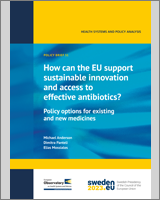NCBI Bookshelf. A service of the National Library of Medicine, National Institutes of Health.
Anderson M, Panteli D, Mossialos E. How can the EU support sustainable innovation and access to effective antibiotics? Policy options for existing and new medicines [Internet]. Copenhagen (Denmark): European Observatory on Health Systems and Policies; 2023. (Policy Brief, No. 51.)

How can the EU support sustainable innovation and access to effective antibiotics? Policy options for existing and new medicines [Internet].
Show detailsAntimicrobial, and particularly antibiotic, resistance poses a significant and growing threat to the health of humans, animals and the environment globally. It is now estimated that antibiotic resistance is one of the leading causes of mortality internationally. In 2019, 133,000 deaths in Europe and 1.27 million deaths globally were directly caused by antibiotic-resistant bacterial infections. Antibiotic resistance has also been estimated to be responsible for approximately 1.5 billion Euros of healthcare costs and productivity losses in Europe alone. While action to address this challenge has accelerated over the last decade, an insufficient antibiotic pipeline and ongoing shortages of essential antibiotics are two of several persistent barriers to reliable access to effective infection prevention and treatment.
In the European Union, the European Commission has developed several initiatives to rejuvenate the antibiotic pipeline and ensure access to effective antibiotics. Some prominent examples include investment in the Innovative Medicines Initiative (IMI); the EU One Health Action Plan against AMR; the EU Global Health Strategy; and the pharmaceutical package presented in April 2023, including revisions to the EU pharmaceutical legislation and a recommendation on stepping up EU action to combat antimicrobial resistance in a One Health approach. The recommendation was adopted by health ministers at the EPSCO-council on 13 June 2023, constituting a decisive step in furthering the work on AMR at EU-level and in Member States. Through this recommendation, for the first time ever, targets at EU-level are set for AMR, antimicrobial consumption, and antimicrobial resistance in human health.
AMR has been a priority for the Swedish government for a long time. Through investment in the ENABLE-2 programme for antibiotic research and development, and an annual revenue guarantee reimbursement model for access to essential antibiotics, the Government of Sweden has demonstrated commitment to developing innovative policy solutions to improving sustainable access to effective antibiotics.
Between January and June 2023, Sweden held the Presidency of the Council of the European Union, choosing to address the challenge of AMR as one of the priorities. During these months our focus has been to maintain the possibility of effective treatment of bacterial infections in humans and animals, and to keep the issue of AMR at the top of the international agenda. As a part of this, the Presidency hosted a high-level meeting on antimicrobial resistance in March 2023 to bring together key EU policy-makers and experts to reflect on different possible measures to ensure sustainable access to effective antibiotics as well as on the EU’s contribution to leveraging progress in tackling AMR on a global level.
To inform discussions during this meeting, this policy brief was developed, summarising key developments and initiatives that aim to secure sustainable access to new and pre-existing antibiotics. We are grateful to the co-authors of this policy brief and all the stakeholders that agreed to be interviewed to share their experiences and insights. We are also grateful to members of the reference group that provided invaluable comments and feedback throughout development of the policy brief.
Looking to the future, I hope that the Swedish Presidency has served as a catalyst to stimulate collective action from EU institutions and Member States to address the consequences of continuously increasing antibiotic resistance, alongside other international and national stakeholders. We have several key milestones ahead of us over the next few years representing opportunities to strengthen global governance and commitment to tackle antimicrobial resistance: the finalisation of the pandemic treaty, the publication of the WHO Europe Roadmap on AMR, and the 2024 high-level meeting at the UN General Assembly. To echo the esteemed Professor Otto Cars in his keynote speech during the high-level meeting on AMR in Stockholm, my wish is that we will look back upon the 2024 UN General Assembly meeting as a turning point. With the meeting, something changed and it spurred true and global collective action. Let’s work together to make this vision come true.
Minister for Social Affairs and Public Health, Sweden
- Foreword by Jakob Forssmed - How can the EU support sustainable innovation and a...Foreword by Jakob Forssmed - How can the EU support sustainable innovation and access to effective antibiotics?
Your browsing activity is empty.
Activity recording is turned off.
See more...